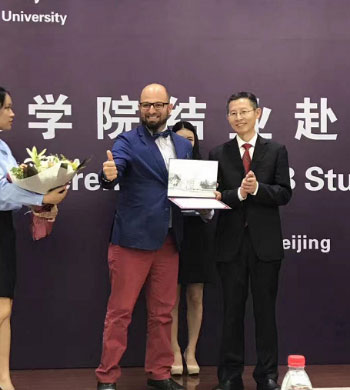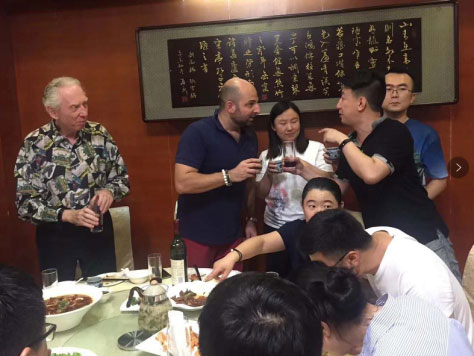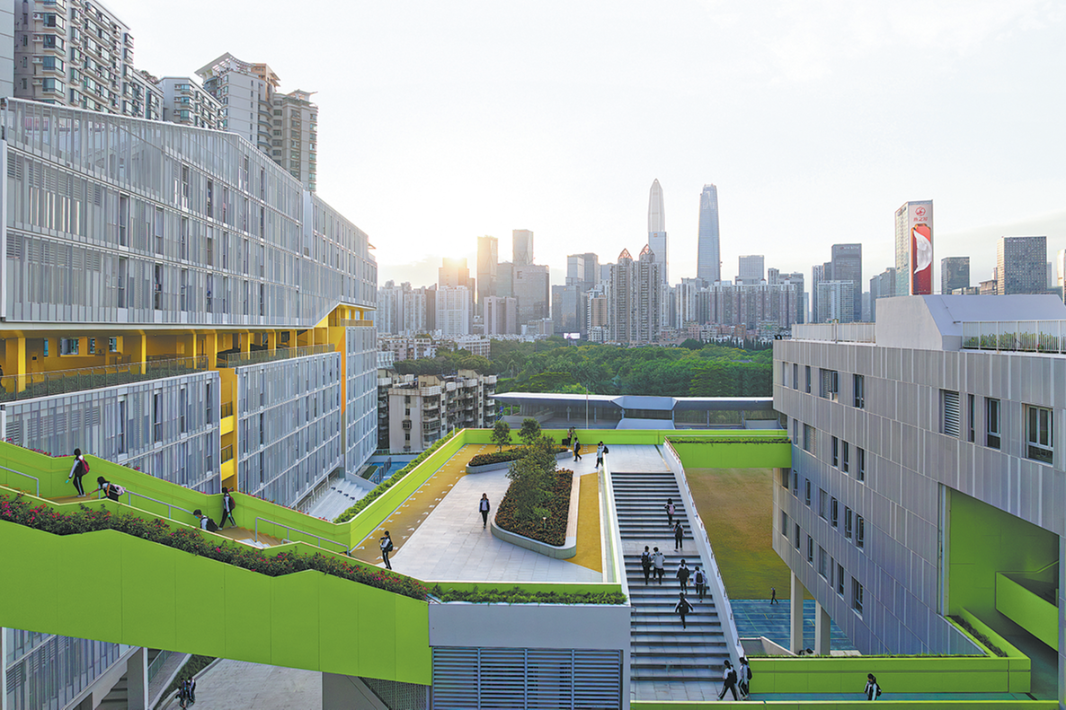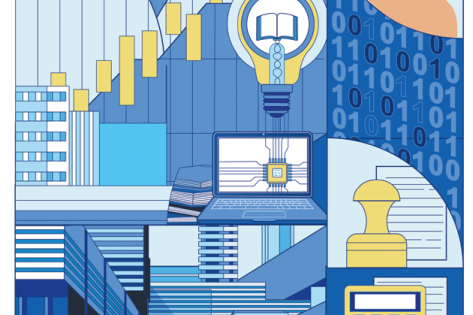Positive energy is driving prosperity in China


I came to China by chance in 2007 when Thierry, a then-colleague of mine at the Italian company I was working for, who often visited China, said to me: “I know you want to go to study abroad. Why not go where things happen now instead of where are written?” So I moved.
I was supposed to stay in China only 6 months when I first came to Beijing as an exchange MBA student at Tsinghua University’s School of Economics and Management. Now it has been 11 years. And I plan to stay possibly much longer. In fact, China has become my home and where I enjoy my professional life as business consultant, lawyer and university lecturer and where I’m even more proudly the father of a 7-year-old mixed-race child.
Why did I settle here? Many reasons were behind the decision, but all those could be summed up in a simple sentence Sharon, a US professor at Tsinghua, who many years ago when I had just arrived in Beijing told me “This is the place to be!”.
So many things are happening in China nowadays, so many changes I personally witnessed since the World Expo in Shanghai and the Olympics in 2008 in Beijing. Foreigners here as well as Chinese I guess will never stop being amazed by the reform trend: from advances in the rule of law, new regulations and country goals setting to social advances in all areas and increasing International exposure: from the speed with which cities grow taller and infrastructures are built, to the frantic replace rate of mum-and-pop shops in the streets (nowadays also replaced by the e-commerce revolution).
Both Chinese and foreigners can observe the speed and pace this country adopted and feel excited about that. This is the great outcome. China became at the same time the most exciting and the most challenging and competitive country in the world. Although many of my Chinese friends, perhaps representatives of a broader population, enjoy going abroad to study and work for a period in order to improve foreign language skills and achieve international experience, ambitious and competent persons are willing to come back as soon as possible to develop their careers and enjoy personal life. At the same time the smartest and most competitive foreigners from all around the world come to China to pursue their goals and success. This is the place to be, but watch out: the most exciting place and a very competitive and tough also. Therefore both Chinese and we foreigners have to be very well equipped and determined to cope with the many challenges facing here. We all need to follow the country’s pace and nobody can really slow down: too many opportunities and challenges here around. Those make most of our lives very exciting and at the same time stressed though. There is in fact a non-written rule everybody apparently unconsciously internalized: we need to do our best. We need to perform greatly in any fields and professions we are. If we do not want to stay behind we constantly need to improve ourselves, get more knowledge, skills, be creative and flexible to adjust and cope with a very fast changing environment. Changes are all around and come from multiple directions. The economy is for sure a main driver of development and changes but those come from the whole society as well. There is such a “streben” (German concept of tension, drive, spleen), an endeavor to improve and make progress that nothing or nobody is excluded. Everybody in China I guess feel somehow proud to be part of the mechanism which lead the country as a whole and every person to feel confident about the future: wealthy successful people believe they will be even more successful in the future, middle class is sure of turning into higher class, lower class people expect to get better and become middle class soon. This is I think one of the main duties of a country leadership: make every inhabitant feel they will have possibilities, a future, and a bright one. How to do that? Create the conditions to improve and generate a positive trend.
I sometime compare the feeling we have here with the situation of western countries. We foreigners often come from places which well-developed long ago like Europe and US and we can enjoy sort of high average citizen’s wealth and welfare. However what is missing sometime is the positive expectation for the future. I believe that human beings mind give that great value: no matter how rich you are nor how good are the living conditions you live in. What really matters is the expectation for the future; as President Xi Jinping said “The improvement of people's well-being has been accelerated, and the ecological environment has gradually improved. The people have gained a stronger sense of fulfillment, happiness and security. We are now one big step closer to the completion of a moderately prosperous society in all respects”.
From my observation and understanding I can see that the reform process works well in that direction that virtually all feel the Chinese Dream of rejuvenating the nation. Surely many “contradictions” still have to be addressed and the journey is not easy as President Xi also stated “With the 40th anniversary of the reform and opening-up policy as a turning point, we shall cut paths through mountains and build bridges across rivers, overcome all difficulties and carry reform through to the end.”

On the one hand China is in some regards the fastest growing worldwide economic and technological superpower which leads many industries spanning from high-tech to consumer and industrial goods. As a business consultant for a large Chinese consulting firm with top large Chinese corporations as clients, I observed the advances in most sectors in the last 10-plus years of several Chinese corporations which are now competitive, high positioned internationally and managed with renowned best practices. As student, researcher and lecturer at Tsinghua University and CAU-China Agricultural University I experience every day the great quality of education in China, the students and faculty talent and dedication and the tremendous endeavor of the system for the last decade to create national and international business champions, education excellence and social welfare.
On the other hand China is still a developing country with many basic needs to be fulfilled. It comes from a very long history which lasted longer than in many other western countries. I might dare to say no other place of the multiple countries I visited and lived in around the world is experiencing anything comparable. The reform process is challenging: it balances modernization and traditional values commingled in the system called socialism with Chinese characteristics which should make the country competitive and successful internationally and keep its own identity of special dedication toward social goals. As President Xi in his 2018 New Year Speech noted, we should strengthen our sense of mission and responsibility, and do practical and fruitful work for the sake of the people’s welfare.

I cannot number the people I met here in China who are totally dedicated to support such a challenging reform process; both Chinese and foreign institutions, decision-makers, scholars, business persons and managers and many others belonging to the local community and representing different interests and viewpoints. They all seem to be an important part of a complex machine whose main goal is to grant prosperity and better future for everybody. Sometime observers from abroad seem not to realize the plurality of voices and contributions there are around the reform process and biases on the rigid decision-making process overlook the reality. On the contrary: Professor Wang at Tsinghua, among others, helped me a lot to drill down my analysis and achieve a deeper understanding. We can witness multiple forces and standpoints involved. For example in the recent debate around the SOEs (State-owned enterprises) reform we are assisting to rich discussions with numerous players. The main goal is to make those entities more effective and better performing but at the same time avoiding the risk of conformism towards pure profit maximization. The way to make improvements is a complex process which involves different stakeholders which always had a relevant weight in the Chinese society. Surely the legislators and institutions responsible for the SOEs (in particular SASAC) have a great deal. At the same time businessmen, practicing lawyers, scholars, philosophers and sociologists, media professionals and many others bring their contribution. I have now spent few years researching the corporate governance enhancement of those firms. The challenge is to make improvements on the management and control system impacting positively on performance without distorting the superior goals SOEs intrinsically have: they are a very important country economy engine (i.e. they represent a big portion of the national GDP) and since creation with the reform and opening-up policy initiated by Deng Xiaoping in 1978, they also represented a device to promote a social model which take great care of the society and its stakeholders as a whole.
In math the difference between a previous state and a following one is called first derivative. No matter the starting point but the trend, as long as it is positive and fast moving expectations in China shine. So do people here: building long bridges (like the impressive Hong Kong-Zhuhai-Macao project), crossing rivers, possibly feeling less and less the stones.
The author is a business consultant and lawyer, university researcher and lecturer. He has been living in Beijing since 2007 and is a proud father of a 7-year-old boy.


































